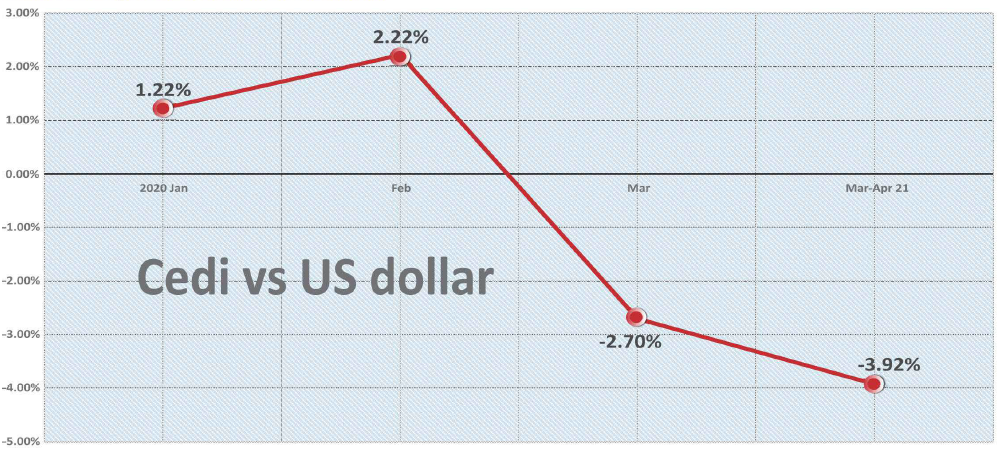Despite all the gains made by the local currency against its major trading currencies at beginning of the year, especially the United States dollar, the coronavirus pandemic impact has washed all away, causing the cedi to lose its strength.
The cedi, which appreciated by 4.5 percent as of the end of February 2020, has seen a depreciation of 3.9 percent from the beginning of March to date (April 21, 2020), owing to reduction in exports, capital flight and high demand for the US dollar lately. At the beginning of March, the cedi was trading at GH¢5.296 to US$1, but is now trading at GH¢5.514.
Thus, from year-to-date, the local currency has appreciated by just 0.33 percent against the US dollar and could enter depreciation territory if demand for forex continues to surge and COVID-19-induced reduction in exports continues.
Finance Minister Ken Ofori-Atta said in March that the capital flight is a result of “related bearish emerging market sentiments and given the high proportion (about 25 percent) of local bonds held by non-resident investors”, adding this could seriously impact the country’s foreign reserves.
Professor of economics and Director in the Institute of Social, Statistics and Economic Research (ISSER) at the University of Ghana, Prof. Peter Quartey, said the cedi-depreciation is expected considering the pandemic has taken a heavy toll on trade globally. He however added that the US$1billion Rapid Credit Facility from the IMF may help the cedi regain some strength.
“The exchange rate is an interplay between demand and supply of foreign exchange. For the supply side, because we are not exporting due to the closure of borders – and with oil and other commodity prices falling, our supply of foreign exchange has gone down. Meanwhile, demand is increasing because people are converting their cedis to dollars with the hope that when the borders are open they can then engage in trading.
“Then, also, we have foreign investors who have bought our bonds and they are moving out of the market because they are not very certain about our economy; and so they would rather disinvest and keep their money. All of these have led to excess demand over supply of foreign currency. But with this US$1billion from the IMF, it will add to the supply of foreign currency and hopefully bring down the exchange rate,” he said in an interview with the B&FT.
Prior to negative impacts from the pandemic, the local currency was tipped by many analysts to experience a better performance against its trading partners this year. Data Bank Research, for example, expressed confidence in the central bank’s FX interventions strategy and monetary policy decisions as key to maintaining stability of the cedi.
“We feel assured by the posture of the monetary authorities in maintaining a broadly stable Ghana cedi in 2020. Our optimism is grounded in the Bank of Ghana’s bi-weekly FX forward auctions, which will deepen forward trading and limit spot market pressures.
“We view the higher-sized allotments for Q1-2020 as reflecting the Bank of Ghana’s commitment to increase forward activities in Q1-2020 when seasonal pressures tend to shock the spot market,” the Data Bank Research said.
But with the tables turning suddenly, the cedi may suffer another heavy defeat against its major trading currencies – especially the dollar and Pound Sterling.
Source: B&FT Online





